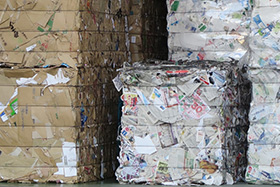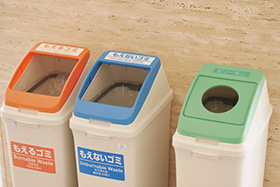News
November – Waste Disposal and Recycling Updated in November 2018
Getting rid of trash in Japan could be a hassle. Rules for disposing waste differ according to where you live. When you move in, most local city offices provide new citizens with a multilingual garbage collection calendar. Different days of the week are designated for various types of trash you can leave in front of your home or collection spots. Some cities provide trash apps which remind you what to throw away the next morning. The sad part is, if you leave the wrong type of trash in the morning, you would come home to your uncollected waste bearing a red warning sticker, but most new residents get used to the routine after a month or so.
Major trash categories in Japan are Combustibles (food scraps, waste paper, diapers, weeds and branches, Glass Bottles/Jars, Cans (steel/aluminum), Plastic Bottles (polyethylene terephthalate), Recyclable Plastic (wrappers, shopping bags, Styrofoam, etc.), Paper (cardboard/old newspapers), Textile (old clothes), Incombustibles (broken glass/ceramics, knives/blades, small electronic items, etc.) and Hazardous Waste (used aerosol spray cans, lighters, batteries, fluorescent tubes, and gas cartridges for portable stove).
To throw away oversized items like furniture, you need to secure a specific collection date by calling or applying online to your city’s recycling center. Japan’s Home Appliance Recycle Law introduced in 2001 obliges retail stores to take back the used or broken appliance under a fixed fee (2,000-6,000 yen paid by customer) whenever delivering a new product. This law covers TV, washing machine/dryer, air con and refrigerators.
Having explained all the rules for trash separation, Japan’s overall recycling rate is still low compared to other OECD nations because Japan placed more emphasis on improving waste incineration technology. Vapor or heat obtained from burning combustible waste is used to generate energy, to heat buildings, or to provide warm water to surrounding facilities. In many parts of Japan, it is quite common to see heated indoor swimming pools right next to waste incineration facilities.
http://www.ebara.co.jp/en/about/technologies/abstract/detail/__icsFiles/afieldfile/2018/08/30/17-54_E.pdf









